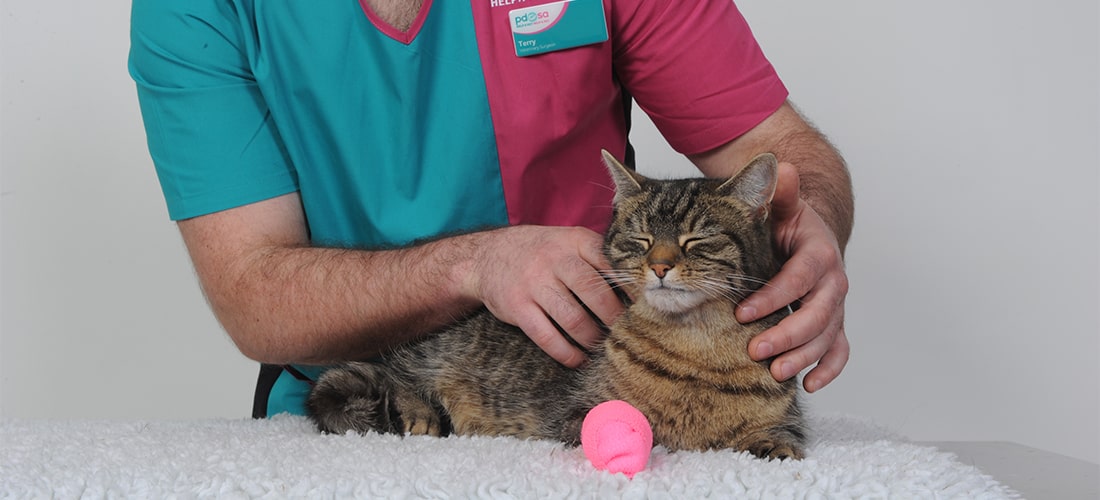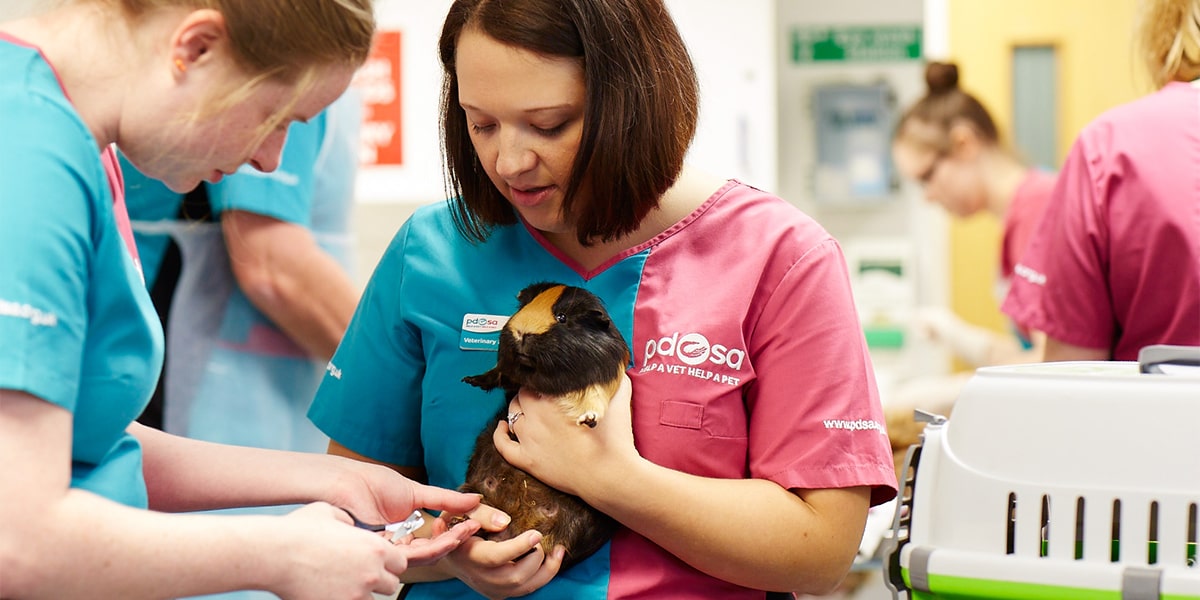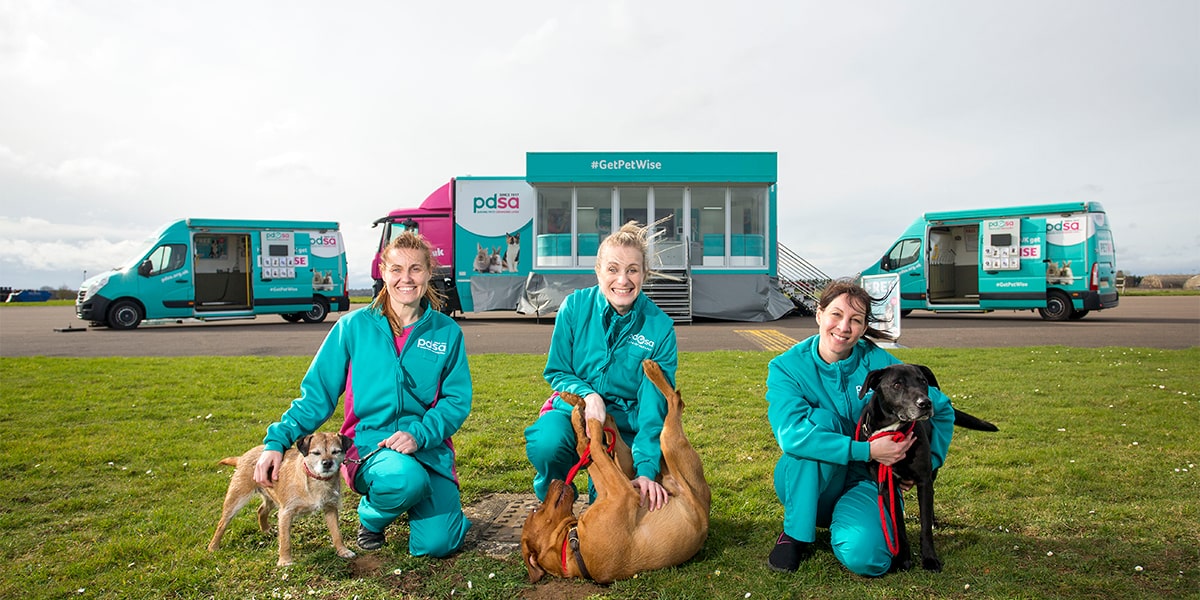How to become a veterinary nurse
Veterinary nurses make up a vital part of the teams in our Pet Hospitals. They work tirelessly alongside the rest of the team to save the lives and improve the health and wellbeing of hundreds of pets every day.
A career as a Registered Veterinary Nurse (RVN) is very rewarding but also involves plenty of hard work. It’s a career that offers a lot of variety and there are some opportunities for progression, depending on the path you choose to take.

As a vet nurse, you’ll be working as a highly skilled part of the overall veterinary team. Nurses are important in the supportive care of animals getting treated and play a huge role – especially with us – in educating a variety of different pet owners.
Just like before training to be a vet, shadowing a vet nurse is the best way to get a good understanding of what they do. You’ll be able to get a real idea of what day-to-day life is like and what it takes to be a veterinary nurse.
There are different pathways to become a veterinary nurse and depending on your chosen focus, your career path could take you to a variety of places. It’s by far the most common to work with small animals, but you could also go into equine nursing, farm work or even specialise in exotic species.
You can work in general practice either at a charity (like PDSA nurses) or private practice. Or you could get a job at a referral clinic working with specialist vets and nurses. There is a huge range of options, though much of the work you could end up doing as an RVN will be similar day-to-day, with jobs focused around looking after your patients.
Here at PDSA, our veterinary nurses work in our hospitals to care for the thousands of sick animals we treat. Nurses will carry out consultations, bandage up wounds and fractures, take blood samples and x-rays and give important medications to their patients. They also assist our veterinary surgeons during operations to make sure each patient is safely prepared for surgery, monitor their vitals during procedures and help to care for them during their recovery. They take fantastic care of any pets we have in for surgical procedures or treatments and can even carry out specialised diagnostic work and certain surgeries under a vet’s direction.
One of the key things our veterinary nurses do is to support and educate owners on how to best care for their pets. Our PDSA community nurses also go into schools to give educational talks to students of all ages about responsible pet ownership.
As a veterinary nurse, like the ones who work with us, you’ll need to be understanding and able to deal with a variety of different people using excellent communication skills. A real passion for the health and welfare of animals goes a long way, too. You’ll need to be able to stay calm and collected in all situations and be prepared for some late nights if you’re ever on call!
What qualifications do I need to become a veterinary nurse?

There are two different pathways you can take to train as a veterinary nurse, either through vocational training or higher education. Veterinary nursing courses can be competitive so you’ll need to meet their minimum entry requirements and be driven and passionate if you want to secure your place.
With either route, you’ll need to make sure your course is a Royal College of Veterinary Surgeons (RCVS) accredited veterinary nursing qualification. Approved programmes include a full-time period of practical nursing training in an approved training practice or practices.
Student nurses must enrol with the RCVS to legally carry out some of the nursing procedures needed for their training. Once nurses are qualified and completed their necessary training hours, they will then be able to register with the RCVS as Registered Veterinary Nurses (RVNs).
Work experience
Work experience is vital if you are looking for a place on a course to become a veterinary nurse and is usually an entry requirement. The more experience you can get, the better! We recommend not only getting experience within a vet practice (ideally at an approved training practice) but in a variety of animal-related environments. For example, you could get experience at a cattery or kennel, rehoming centre or even a local farm or abattoir.
It’s also important for you to get experience because you’ll learn more about what is required of you to do the role and whether you’re suited to it. You could potentially be studying for four years or more and you want to enjoy the job for many years after that, so you need to be sure this is the career path for you!
Of course, we know that studying hard to be a veterinary nurse is absolutely worth it. This is why we offer those studying to become a vet nurse voluntary work placements or ‘Seeing Practice’ (or Extra-Mural Studies/EMS) within our pet hospitals. If you’d like to train to become a veterinary nurse with PDSA, you need to join as one of our amazing Veterinary Care Assistants (VCAs) and pursue your training that way.
Vocational qualifications
What college courses are available to become a vet nurse?
A vocational qualification is the quickest way to become an RVN. If you decide this is for you, you can complete a Level 3 Diploma in Veterinary Nursing, which can take as little as two years to complete full-time.
You can do the Level 3 Diploma as an Advanced Apprenticeship alongside employment in a veterinary practice, or as a non-apprenticeship route. Through the Advanced Apprenticeship route, you’ll ‘earn while you learn’ and sometimes employers will fund your course fees.
A popular choice for people wanting to train as an RVN is to complete the Level 3 Diploma in Veterinary Nursing through a non-apprenticeship route. Practical work experience can be gained through employment or, more commonly, through a voluntary work placement. Your college will usually help students who aren’t in employment find voluntary work placements with RCVS-accredited Training Practices.
These vocational routes means you’ll spend time both in a classroom (either as day-release or block placements) and working in practice. This is great if you do well in the working environment, plus you’ll get plenty of hands-on experience so it’s ideal for anyone looking to get stuck in straight away. However, you will have to balance academic demands with full-time work which (especially if you are on an Advanced Apprenticeship) could involve anti-social working hours or night-shift work.
Where can I get my Level 3 Diploma in Veterinary Nursing?
There are several RCVS-accredited further education colleges with courses in Veterinary Nursing across the country.
Entry requirements will depend on the course you are studying and where you are studying, but minimum requirements are usually five GCSEs at at least grades C or 4, or five Scottish National 5s at grades A to C (or Standard Grades at grades one to three). Your qualifications must include English, Maths and a science subject. As the courses are quite competitive, it’s essential to have work experience in practical veterinary work, too.
Instead of going through a college, you can also apply directly for employment as a student or apprentice nurse with an RCVS-approved Training Practice to secure your apprenticeship placement with one of these practices.
Can I upgrade my Level 3 Diploma to a degree?
Once you have completed your Level 3 Diploma, it is possible to ‘top up’ your qualification to a full BSc honours degree through an additional course offered at universities. This can open the door to postgraduate opportunities in specialist areas, such as physiotherapy, behaviour, teaching or research. You can also further your skills and knowledge with a Graduate Diploma in Veterinary Nursing, which could lead to more responsibility in your field.
Higher education
Can I do a degree in veterinary nursing?
Another pathway to becoming an RVN is through a higher education course. Several universities offer the opportunity to complete a Foundation Degree in Veterinary Nursing (FdSc), or a BA (Hons) in Veterinary Nursing.
A degree will usually take three to four years to complete, so it’s the slower of the two pathways. Degrees are more academically focussed, so more time will be spent learning the theory and developing in the classroom. But you will still need to complete the same minimum amount of practical work-experience on placements in approved training practices.
This pathway is great for anyone who wants to experience university and gain a degree, which can open up different career paths or the possibility of further study. There are several RCVS-accredited degrees in veterinary nursing across the country.
Each university’s entry requirements will be different, so have a look on their websites to find out theirs. Often, you will need evidence of practical work experience in a veterinary setting, as well as specific A-Levels or equivalent qualifications. They are also very competitive, so be prepared to exceed the minimum requirements and show you’re really passionate about becoming a veterinary nurse.
An advantage of taking this pathway is that you have a more structured approach to learning and often have more time to balance the demands of study against placement work. There are also postgraduate opportunities available for nurses who wish to move into a specialist area, such as physiotherapy, with this route.
Funding my qualification

Don’t let cost put you off becoming a vet nurse if you are sure it’s the right job for you! There are lots of ways you can fund your studies, even if you’re 19+.
If you choose the Level 3 Diploma path and are under 18, it’s likely your fees will be covered. If you are older than 18, your course may be eligible for an Advanced Learner Loan. Contact your training provider to find out if you are eligible.
If you are eligible for an Apprenticeship (i.e. if you can secure employment in a veterinary Training Practice), you will get a small salary and sometimes your practice may pay for your course fees as well. However, if employers are paying for your course fees then they may expect you to stay with them for a certain amount of time after completing your training as part of your training contract, so check if this is the case and bear this in mind
If you are not doing an Apprenticeship and instead doing voluntary work placements, be aware you won’t get paid and you’ll have to fund any expenses, e.g. commuting or accommodation.
If you’re looking at a higher education qualification and it’s your first degree, you may be eligible for a government loan to cover tuition fees and maintenance costs. There is no age limit to these loans and repayments begin once you have completed your degree and are in full-time employment (earning at least £25,000 p/a). You can find out more about student finance and how to apply on the government’s website. You may also be eligible for government grants depending on your circumstances.
Each training provider may also offer its own funding packages or have a directory of bursaries available to their students. Check their websites or speak to their student finance advice team on an open day or by getting in touch with their office.
There may also be bank loans available to help cover the cost of a higher education qualification. This can be helpful if the other options are not available to you. Speak with your bank to see what they are able to offer.
